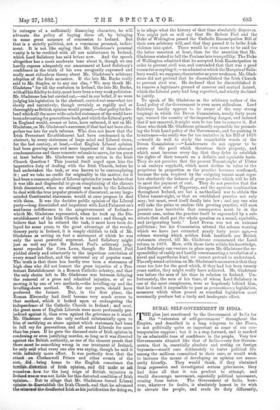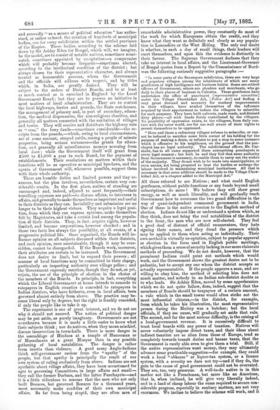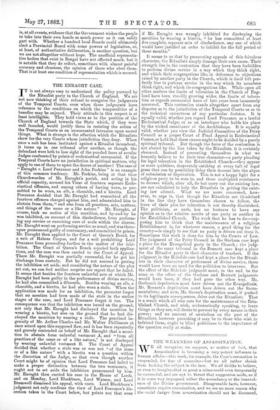RURAL SELF - GOVERNMENT IN INDIA.
THE plan just sanctioned by the Government of In lia for the " extension of self-government " throughout the Empire, and described in a long telegram to the Times, is not politically quite so important as some of our con- temporaries suppose ; but it is a step forward, and is marked by an admirable tone of confidence in the people. Very few Governments situated like that of India—very few Govern- ments, that is, essentially absolute and resting on foreign bayonets—would care deliberately to foster political life among the millions committed to their care, or would wish to increase the means of developing an opinion not neces- sarily friendly. They would think, if they abstained from repression and investigated serious grievances, they had done all that it was prudent to attempt, and would discourage movement, especially political movement, coming from below. The Government of India, how- ever, whatever its faults, is absolutely honest in its wish to elevate the people, and reads its duty differently, and avowedly " as a means of political education " has autho- rised, or rather ordered, the creation of hundreds of municipal bodies, one for every subdivision within the settled provinces of the Empire. These bodies, according to the scheme laid down by Sir Ashley Eden for Bengal, which will, we imagine, be the model, are to consist of notable natives, sometimes nomi- nated, sometimes appointed by co-optation—a compromise which will probably become frequent—sometimes elected, according to the intellectual condition of the district ; but always chosen for their representative character, and always treated as honourable persons, whom the Government and the officials will address with respect, and by titles which, in India, are greatly desired. They will be subject to the orders of District Boards, and to at least as much control as is exercised in England by the Local Government Board ; but they are to possess an initiative in most matters of local administration. They are to control the local highways, ferries and pounds, the State rest-houses, the management of primary and, in part of secondary, educa- tion, the medical dispensaries, the non-religious charities, and generally all matters connected with the sanitation of villages and towns. They will receive and distribute the highway rate or " cess," the ferry funds—sometimes considerable—the re- ceipts from the pounds,—which, owing to local circumstances, are of some amount, strayed cattle, among a people of minute properties, being serious nuisances—the grants for educa- tion, and generally all miscellaneous moneys accruing from local dues ; while the Government itself will grant from £500 to £1,000 a year to each Board, for the payment of establishments. Their resolutions on matters within their functions will be as operative as municipal bye-laws, and the agents of Government will, whenever possible, support them with their whole authority.
These are humble duties and limited powers and tiny re- sources, but the plan involves, nevertheless, certain very con- siderable results. In the first place, natives of standing are encouraged and, indeed, adjured to meet frequently—their travelling expenses are paid—to discuss affairs, to intervene in affairs, and generally to make themselves as important and useful in their districts as they can. Invisibility and submission are no longer to be their highest virtues. They acquire a legal posi- tion, from which they can express opinions, make themselves felt by Magistrates, and take a certain lead among the popula- tion of their districts. They, in fact, acquire rights, however limited, and become corporations, however checked ; and in those two facts lies always the possibility, at all events, of a progressive political life. Once organised, the Boards will in- fluence opinion on all subjects discussed within their districts, and such opinion, once ascertainable, though it may be over- ridden, cannot be disregarded. If the Boards work, moreover, their attributes are certain to be increased. The Government does not desire to limit, but to expand their powers ; all manner of local functions may be committed to their charge, particularly an inspecting authority over village police ; and the Government expressly sanction, though they do not, as yet, enjoin, the use of the principle of election in the choice of the members of the Boards. In principle, in fact, everything which the Liberal Government at home intends to concede to ratepayers in English counties is conceded to ratepayers in Indian districts, who have hitherto, even in local affairs, been governed almost entirely from above. The practice may be- come liberal only by degrees, but the right is frankly conceded, if only the people like to take it up.
The experiment is one of great interest, and we do not see why it should not succeed. The notion of political danger may be put aside, as purely imaginary. Governments are not overthrown because it is made a little easier to know what their subjects think ; nor do natives, when they mean mischief, discuss insurrection in town-halls. There is more danger in the assemblage of Hindoos at a temple of Hunooman or of Mussulmans at a great Mosque than in any possible gathering of local notabilities. The danger is rather from inertia than violence. A good many Anglo-Indians think self-government useless from the " apathy" of the people, but that apathy is principally the result of our own system of ruling exclusively from above. Indians are not apathetic about village affairs, they have been accustomed for ages to governing Committees, in large affairs and small— they call the former Barbara, and the latter Punchayets—and it is a little ridiculous to assume that the men who not only built Benares, but governed Benares for a thousand years, must necessarily make muddles of their own municipal affairs. So far from being stupid, they are often men of remarkable administrative power, they constantly do most of the work for which Europeans obtain the credit, and they know what they want as definitely and clearly as any popula- tion in Lancashire or the West Riding. The only real doubt is whether, in such a day of small things, their leaders will exert themselves, and upon this the evidence is distinctly in their favour. The Supreme Government declares that they take an interest in local affairs, and the Lieutenant-Governor of Bengal quotes from a Report by the Commissioner of Bard- wan the following curiously suggestive paragraphs :- " In some parts of the Serampore subdivision, there are very large and populous villages, among the inhabitants of which are many gentlemen of high intelligence and business habits. Some are retired officers of Government, others are pleaders and merchants, who go daily to their places of business in Calcutta. These gentlemen have undertaken the office of punchayet [representative committee] under the Village Chowkidari Act, [Police Act] and finding a very great demand and necessity for sanitary improvements in their villages, have availed themselves of the influence acquired by their appointment to induce the villagers to subscribe for such purposes. They have built culverts, made roads, and drained dirty places,—all with funds freely contributed by the villagers. No possibility of oppression exists, as the villagers, from daily con- tact with the outer world, are far too well aware of their rights to permit themselves to be oppressed.
"Here and there a refractory villager refines to subscribe, or can- not be induced to sacrifice some little corner of his holding for the purpose of making a drain, or refuses to put a stop to some nuisance which is offensive to his neighbours, on the ground that the pun- chayet has no legal authority. The subdivisional officer, Mr. Car- stairs, has in all cases supported these enterprising punchayets in every legal manner ; but both he and they feel that some authority from Government is necessary, to enable them to carry out the wishes of the majority. They do not wish to be made into municipalities, or even unions, not being prepared to bear the burden or undergo the labour involved in maintaining municipal institutions. All that is necessary is that some addition should be made to the Village Chow- kidari Act, or a chapter added to the Municipal Act."
All those referred to are Natives ; and what could English gentlemen, without public functions or any funds beyond small subscriptions, do more ? We believe they will show great energy, as well as much liberality, and will gradually teach Government how to overcome the two grand difficulties in the way of quasi-independent communal government in India. One of these is the native aversion to the English method of election. Indians do not like or understand a system which, as they think, does not bring the real notabilities of the district to the front, the men who are now self-elected. They feel a good deal of distrust of official enumerators, they hate signing their names, and they dread the pressure which may be applied to them when acting so individually. Their own method is virtually co-optation, subject to popular approval or election in the form used in English public meetings, which gives them a sense of security lacking in our more elaborate methods of proceeding. We do not doubt, however, that the prominent Indians could point out methods which would work, and the Government shows the greatest desire not to be pedantic, but to accept any one whom the district accepts as actually representative. If the people approve a man, and are willing to obey him, the method of selecting him does not much matter, and nobody in an Indian sub-district doubts as to who leads. Sir Ashley Eden, moved by some apprehension which we do not quite follow, does, indeed, suggest that the members of Boards should be taxpayers of a certain amount, a rule which in the small towns would often strike out the most influential citizens,—in the district, for example, from which he takes his illustration, the most representative person during the Mutiny was a butcher; but the local officials, if they see cause, will gradually set aside that rule. The second, and far the most serious difficulty, is the raising of .a local-government revenue. It is excessively difficult to trust local boards with any power of taxation. Natives will never voluntarily impose direct taxes, and their ideas about indirect taxation are so alien from those of Europe, tend so completely towards transit duties and bazaar taxes, that the Government is rarely able even to give them a trial. Still, if the native representatives want money, they may ultimately advance some practicable suggestion—for example, they could work a local " abkaree " or liquor-tax system, or a licence system, with a severity we dare not try—and if they do, the gain to the cause of good government could not be overrated. They are, too, very generous. A well-to-do native is in this matter not like a Frenchman, but more like an American, that is, when inclined, he will give very liberally indeed, and in a land of cheap labour the sums required to secure con- siderable progress, especially in sanitary matters, are not very enormous. We incline to believe the scheme will work, and it is, at all events, evidence that the Government wishes the people to take into their own hands as much power as it can safely part with. Whether a hundred local Boards could ultimately elect a Provincial Board with some powers of legislation, or, at least, of authoritative deliberation, is another question, but we are not altogether without hope. The unofficial representa- tive bodies that exist in Bengal have not effected much, but it is notable that they do reflect, sometimes with almost painful accuracy and clearness, the opinion of those who elect them. That is at least one condition of representation which is secured.




































 Previous page
Previous page